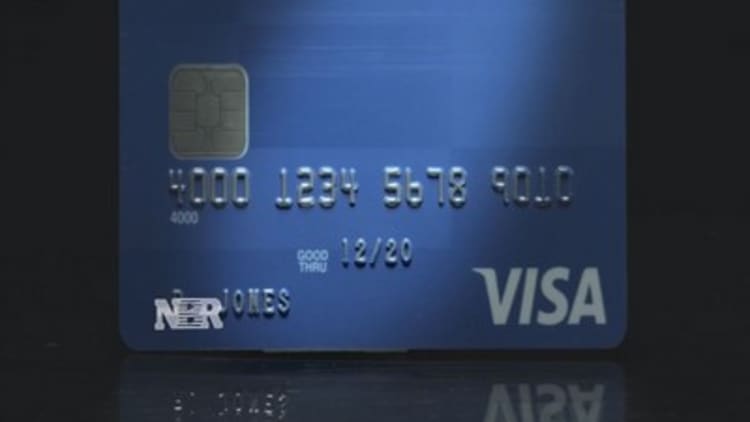
The change from credit cards that you swipe to chip-enabled ones that you dip is expected to accelerate as an Oct. 1 deadline approaches that will make merchants liable for fraudulent charges if they don't accept the more secure chip cards.
But most American credit card holders aren't ready for chip cards. Six out of 10 credit card holders still don't have a chip card, according to a new survey by CreditCards.com.
Neither are merchants. BridgePay Network Solutions, a payments software maker, estimates that only 5 to 10 percent of U.S retailers are prepared to accept chip cards, known in the industry as EMV cards, named after EuroPay, MasterCard and Visa that created the technology standard. Consulting firm Ovum found that 36.8 percent of merchants it surveyed have no interest in adopting EMV in the future and estimates more than 5 million businesses aren't ready for chip cards.
The liability shift, which is being imposed by the credit card industry itself, will make most U.S. merchants liable for any fraudulent transactions if their credit card readers do not accept EMV card payments. Previously, credit card issuers were the ones liable for any fraudulent transactions. Regardless, consumers won't be on the hook for the fraud.
While the shift will not make the consumer liable for fraud, experts note that it will bring several changes. "I think it's going to take a lot of time for people to get used to it," said Laurence Cooke, co-founder and CEO of nanoPay, an online payments company.
Consumers using chip cards will have to pay by dipping their cards into the point of sale terminal and either input a pin number or sign the receipt. Even though EMV transactions process a few seconds faster than swiping, "it will feel like it takes longer to pay because people can't just swipe and put away their cards," said Sean McQuay, credit cards expert at NerdWallet, which provides online credit card comparison tools. "People should expect long lines this holiday season," he said.
Many consumers in the U.S. are not familiar with this technology and the shift will also force businesses to train their employees in using it, Cooke said.
Transactions executed using EMV cards are more secure than those done by swiping because they create a temporary payment credential for every transaction, while the payment information in a card's magnetic stripe remains the same.
But "it's not until both consumers and merchants switch to EMV that you'll have greater said security," McQuay said.
The shift will make online transactions a bigger target for fraud since it does not change how those payments are processed, McQuay said, and transactions at the gas pump will be more targeted because the liability shift for gas stations does not kick in until 2017.
The transition from traditional magnetic stripe to EMV credit cards will take time. "We're not going to have an overnight shift," McQuay said.
Matt Schulz, senior industry analyst at CreditCards.com, expects more merchants to adopt EMV readers by the end of the year. "This is the biggest change in decades in how credit cards are used in America, so we shouldn't be surprised that things are moving slowly," Schulz said.
Chip cards will make buying things overseas easier and safer for Americans who travel because EMV technology has broad adoption internationally, Schulz said.
The embrace of chip cards by merchants also could benefit consumers who prefer using mobile payment services, such as Apple Pay and Android Pay, because more merchants will be installing EMV terminals that are compatible with mobile payment technology. "While there will be more places that take EMV-chipped cards, there will also be more places that take these services," Schulz said.
Correction: An earlier version of this story incorrectly attributed estimates of merchant EMV adoption from BridgePay Network Solutions to Fiserv.





